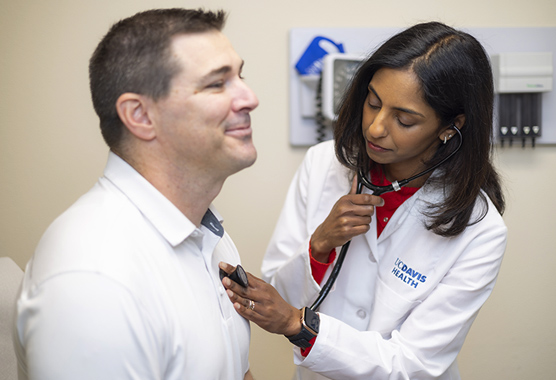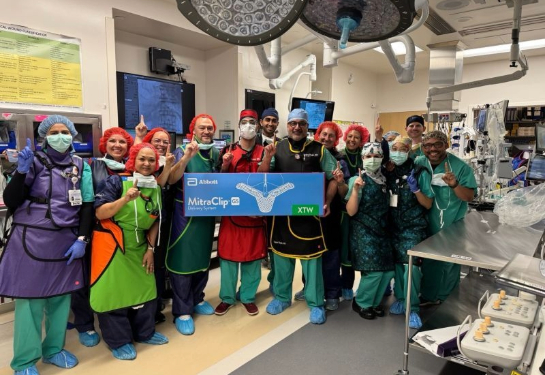Cardiomyopathy
Our specialists work together to provide you with excellent and leading-edge cardiomyopathy care. Discover new devices and therapies only available through UC Davis Health clinical trials.
Medically reviewed on May 25, 2023.

Heart Care for All Stages of Life
UC Davis Health works to diagnose and treat cardiomyopathy early. If left untreated, cardiomyopathy can cause your heart to weaken. As a result, your heart delivers less blood to your limbs, brain and other organs.
Our team of expert cardiologists and cardiac surgeons care for people with cardiomyopathy in all stages of life. We use the latest medical technology and research advancements to create personalized treatment plans for each patient. Your heart is in great hands at UC Davis Health.
What Is Cardiomyopathy?
Cardiomyopathy, sometimes referred to as heart muscle disease or enlarged heart, is a disease of the heart muscle. In most cases, it causes your heart muscle to enlarge or become thick or rigid.
These changes make it difficult for your heart to pump blood throughout the body. In rare cases, cardiomyopathy causes diseased heart muscle tissue to be replaced with scar tissue.
Cardiomyopathy has several types, including:
- Arrhythmogenic right ventricular dysplasia
- Dilated cardiomyopathy
- Hypertrophic cardiomyopathy
- Hypertrophic obstructive cardiomyopathy
- Ischemic cardiomyopathy
- Restrictive cardiomyopathy
- Transthyretin amyloid cardiomyopathy
Cardiomyopathy Symptoms
It’s important to recognize the warning signs of cardiomyopathy. Many people don’t know they have the disease and miss the opportunity to be diagnosed and treated by a physician early, when it can do the most good.
Common Symptoms
Symptoms of cardiomyopathy often include:
- Chest pain, especially after activity or meals
- Fainting during physical activity
- Heart murmurs
- Irregular heartbeat (arrhythmia)
- Shortness of breath
- Swelling in the lower body, abdomen or neck
- Tiredness or weakness
Emergency Symptoms
Call 911 immediately if you experience heart attack symptoms, such as:
- Discomfort in your arms, back, stomach, neck or jaw
- Collapse and sudden cardiac arrest
- Nausea or vomiting
- Heart palpitations
- Shortness of breath
Cardiomyopathy Causes
Often, the exact cause of cardiomyopathy is unknown. We know that the disease can be caused by your genes (inherited through your parents) or other medical conditions that you develop (acquired). Acquired cardiomyopathy can develop from:
Autoimmune Diseases
Conditions that affect your immune system cause inflammation in your body and can damage your heart over time.
Endocrine Disorders
Problems with hormone balance and production can lead to changes in your heart and blood pressure, increasing your risk for cardiomyopathy.
Existing Heart Conditions
Heart problems, such as coronary heart disease, heart valve issues, heart attack, hemochromatosis, sarcoidosis or amyloidosis can lead to cardiomyopathy.
Infection
Cardiomyopathy can develop after infection, such as viral hepatitis, HIV and COVID-19.
Musculoskeletal Disorders
Conditions that weaken your muscles and reduce muscle mass, such as muscular dystrophy, can also impact your heart muscle.
Pregnancy
In rare cases, pregnant women can develop cardiomyopathy during or after pregnancy.
Cardiomyopathy Risk Factors
In addition to family history and existing medical conditions, there are lifestyle factors that can raise your risk of cardiomyopathy, such as:
Alcohol and Drug Misuse
Alcohol and drug use, including cocaine or amphetamines, can cause damage to your heart tissues and function.
Lack of Nutrition or Exercise
A healthy body needs the right nutrients and support. Adopting heart-healthy habits, from the foods you choose to your everyday movement, can help reduce your risk of cardiomyopathy.
Pregnancy
Pregnancy can increase your risk for developing or worsening cardiomyopathy.
Stress
Extremely stressful situations can trigger sudden and severe heart problems. Long-term stress can also cause damage to your heart muscle over time.
Cardiomyopathy Diagnosis and Testing
Your physician will do a physical exam. They will also ask questions about your medical history, family medical history and recent symptoms. A cardiologist specializes in heart conditions and will diagnose and treat cardiomyopathy.
Your physician may order one or multiple tests to confirm cardiomyopathy and any conditions related to the disease, such as:
- Ambulatory monitors (Holter monitor), which record your heart’s activity over a period of time
- Blood tests to check your electrolyte levels or look for genetic issues
- Electrocardiogram (ECG or EKG) to detect your heart’s electrical activity and measure the time and duration of its activity.
- Heart or myocardial biopsy, which involves taking and analyzing a small piece of tissue from the heart muscle.
- Stress tests, which are medically supervised exercise tests, check if physical exertion triggers or worsens cardiomyopathy.
You may also get imaging tests, such as:
- Cardiac catheterization, a procedure in which physicians place a tube (catheter) in your coronary arteries. This helps them understand how your heart is working.
- Chest X-ray may be used to take pictures of the inside of your chest. It shows if your heart is enlarged.
- Coronary angiography, a procedure in which dye is injected into your coronary arteries. The dye can be seen on an x-ray, allowing your healthcare professional to study blood flow among your heart and blood vessels.
- Echocardiogram, which uses sound waves to create pictures of your heart’s size, structure and motion.
Treatments for Cardiomyopathy
For most people, the goal of treatment is to slow the progression of cardiomyopathy and control its symptoms. If a physician has diagnosed you with the disease, but you don’t have symptoms, you may decide together that treatment isn’t needed.
If necessary, your physician may change your diet, activity level, and other aspects of your lifestyle. This treatment is often combined with medications, medical devices, and surgery. We are the only medical center in Sacramento, Calif. performing alcohol septal ablation.
Your treatment plan will depend on your type of cardiomyopathy, how severe it is, and whether you have any additional medical complications.
Medications
Cardiomyopathy often restricts the flow of blood. Your physician may prescribe medicine that will:
- Remove excess sodium and fluids from your body
- Relax your blood vessels (blood pressure) and make it easier for your heart to pump blood
- Slow your heart rate if you have an irregular heartbeat
- Balance your electrolyte levels
- Thin the blood to help prevent clots
Lifestyle Changes
Adopting heart-healthy lifestyle changes is the most common way to prevent and treat cardiomyopathy. These lifestyle changes include:
- Controlling cholesterol levels
- Eating a heart-healthy diet
- Exercising regularly
- Limiting or avoiding alcohol consumption
- Losing excess weight
- Managing chronic conditions like diabetes or sleep apnea
- Quitting smoking or other tobacco use
Nonsurgical Therapies
Your physician may recommend nonsurgical procedures to treat cardiomyopathy, including:
- Alcohol septal ablation: A physician injects ethanol (alcohol) into the artery that supplies blood to the affected area of the heart muscle thickened by cardiomyopathy. A small part of the muscle dies, shrinking the tissue to its normal size.
- Radiofrequency or catheter ablation: This procedure is not a direct treatment for cardiomyopathy. Rather, it stops certain irregular heartbeats, a common symptom of cardiomyopathy. Physicians pass tubes (catheters) through blood vessels to the heart. A machine will send energy through the tubes to create a small scar on the heart tissue. Those scars prevent abnormal electrical signals from causing irregular heartbeats.
Surgery
If medications, therapies and lifestyle changes are not effective, your physician may recommend one of several surgeries to treat cardiomyopathy.
Devices to correct an irregular heartbeat include:
- Pacemaker: A small device that uses electrical pulses to prompt the heart to beat normally.
- Implantable cardioverter defibrillator (ICD): A device that maintains a heart’s normal rhythm by sending a shock to the heart if it detects an irregular heartbeat.
Devices that can help improve blood flow include:
- Cardiac resynchronization therapy (CRT) device: A physician implants the CRT device into the lower chambers of your heart (ventricles). The device helps your ventricles contract together rather than at different times.
- Left ventricular assist device (LVAD): LVAD is a mechanical pump that helps the heart pump blood to the body.
Other surgical procedures include:
- Septal myectomy: This surgery improves blood flow. It is often reserved for younger people or people for whom medications are ineffective. In this procedure, the surgeon removes the part of the heart’s thickened wall (septum) bulging into heart’s left ventricle.
- Heart transplant: A physician replaces a person’s diseased heart with a healthy donor heart. A heart transplant is often a treatment of last resort. Most transplant recipients are in end-stage heart failure.
How many people in the US have cardiomyopathy?
1 in 500Adults in the U.S.
Source: Centers for Disease Control and Prevention (CDC): Cardiomyopathy
Request an Appointment
As Sacramento's No. 1 hospital, you'll benefit from unique advantages in primary care and specialty care. This includes prevention, diagnosis and treatment options from experts in 150 specialties.
Referring Physicians
To refer a patient, submit an electronic referral form or call.
800-4-UCDAVIS
Patients
Call to make an appointment.
Consumer Resource Center
800-2-UCDAVIS

Ranked among the nation’s best hospitals
A U.S. News & World Report best hospital in cardiology, heart & vascular surgery, diabetes & endocrinology, ENT, geriatrics, neurology & neurosurgery, and pulmonology & lung surgery.

Ranked among the nation’s best children’s hospitals
U.S. News & World Report ranked UC Davis Children’s Hospital among the best in pediatric nephrology, orthopedics*, and pulmonology & lung surgery. (*Together with Shriners Children’s Northern California)

Ranked Sacramento’s #1 hospital
Ranked Sacramento’s #1 hospital by U.S. News, and high-performing in aortic valve surgery, back surgery (spinal fusion), COPD, colon cancer surgery, diabetes, gynecological cancer surgery, heart arrhythmia, heart failure, kidney failure, leukemia, lymphoma & myeloma, lung cancer surgery, pacemaker implantation, pneumonia, prostate cancer surgery, stroke, TAVR, cancer, orthopedics, gastroenterology & GI surgery, and urology.

The nation’s highest nursing honor
UC Davis Medical Center has received Magnet® recognition, the nation’s highest honor for nursing excellence.

World-class cancer care
One of ~59 U.S. cancer centers designated “comprehensive” by the National Cancer Institute.

A leader in health care equality
For the 13th consecutive year, UC Davis Medical Center has been recognized as an LGBTQ+ Healthcare Equality Leader by the educational arm of America’s largest civil rights organization.

